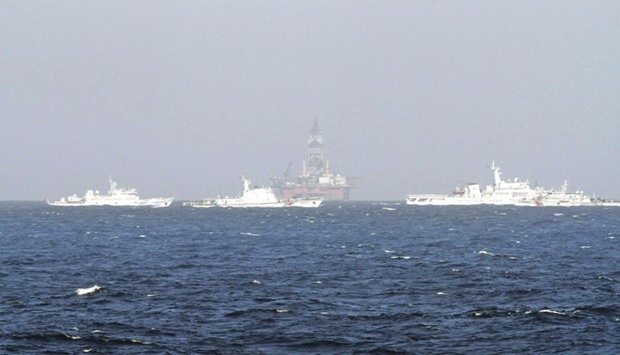
The disputed oil rig is seen in the South China Sea, off the shore of Vietnam.
Vietnam demanded China move a controversial oil rig yesterday and abandon plans to start drilling in waters where jurisdiction is unclear, the latest sign of festering unease among the two communist neighbours.
The $1bn rig, which was at the centre of a fierce diplomatic stand-off between the countries in 2014, had moved into an area of the Gulf of Tonkin in the South China Sea about which Vietnam said the two countries were still “executing delineation discussions”.
China calls the rig Haiyang Shiyou 981. Vietnam refers to it as Hai Duong 981.
“Vietnam resolutely opposes and demands China cancel its plan to drill and immediately remove the Hai Duong 981 oil rig out of this area,” foreign ministry spokesman Le Hai Binh said in a statement on the government’s news website.
China claims most of the resource-rich South China Sea amid rival claims by Brunei, Malaysia, the Philippines, Taiwan and Vietnam.
China, Binh said, should take “no further unilateral actions that further complicate the situation, and make practical contributions to peace and stability”.
Two years ago, China parked the rig for 10 weeks in waters Vietnam considers its exclusive economic zone, triggering their worst row in decades and an outcry among Vietnamese nationalists.
Many experts call the move a miscalculation by Beijing that played into the hands of the United States. Since the row, Vietnam has become closer to Washington than ever before.
Vietnam closely tracks the movement of the oil rig which has operated as far away as the Bay of Bengal and has been close to disputed waters several times since 2014.
It was the second occasion this year that Vietnam has protested against the rig’s activity, both times coinciding with leadership changes in Hanoi.
Its previous complaint about the rig was in January, two-days before the start of its Communist Party’s five-yearly congress.
Binh also criticised China’s decision to start operating a lighthouse on one of its artificial islands in the Spratly archipelago, which he said violated Vietnam’s sovereignty and was “illegal and worthless”.
Vietnam’s parliament approved Nguyen Xuan Phuc as the communist country’s new prime minister yesterday, handing him a five-year term and a range of tough challenges from domestic economic reforms to a simmering maritime dispute with China.
Phuc, a former deputy prime minister, was the only candidate nominated for the position by party officials earlier this year and won 90.26% of the votes in the rubber stamp parliament, according to state-run VTV.
“I will do my best to serve the country and people,” said the 61-year-old, whose election marks the completion of a five-yearly reshuffle of the Communist Party’s top brass.
Phuc takes over from former prime minister Nguyen Tan Dung, a charismatic leader who championed a reformist pro-business agenda and talked tough to Beijing over a territorial dispute in the contested South China Sea.
Dung lost out in internal party elections in January, which analysts called a move back towards more consensus-based rule by the party’s conservative wing.
“Dung was an individualist working within a conservative system of collective leadership. His demise is evidence that Vietnam is not yet ready for a modern, world savvy, prime minister,” Vietnam expert Carl Thayer told AFP.
Authoritarian Vietnam is run by the Communist Party and officially led by a triumvirate of the party secretary general, president, and prime minister, with key decisions being made by the 19-member politburo.
Top communist leader Nguyen Phu Trong was reelected in January as party secretary general in a victory for the party’s old guard.
On Saturday, the National Assembly approved a top police general, Tran Dai Quang, as president — a key if largely ceremonial role.
New prime minister Phuc is “a competent technocrat” and will stick to the party line, Thayer said.
“Phuc does not have the charisma of Dung. He will be a team player,” he added.
Even senior party members greeted Phuc’s election Thursday with a lukewarm reaction.
Communist Party veteran Tran Tuan Hung, 76, expressed concern over the financial troubles the new premier has inherited.
“How can he resolve public debt, budget deficits and corruption? I don’t rely or expect much from him,” he said.
Army general Nguyen Trong Vinh also told AFP the new leader was “nothing special” and that he did not expect much change under his watch.
In the past, the leadership handover was decided at the party congress in January but took up to six months to be confirmed by the National Assembly.
Analysts say the process has moved more quickly this year, partly because several top leaders are retiring from politics, and also because of an upcoming visit by US President Barack Obama in May.
“The new leadership is anxious to dismantle (former PM) Dung’s network and gain prestige in the eyes of ordinary Vietnamese by meeting and greeting world leaders,” Thayer told AFP, adding that rising tensions with China has added to the urgency.
Well-known dissident Nguyen Thanh Giang, who spent time in jail for his criticism of the party in the 1990s, called Phuc’s appointment a “step backwards” from Dung.
“Phuc is not comparable in terms of competence, experience, international image. He has no international reputation and will need a lot of time to develop one,” he told AFP.
